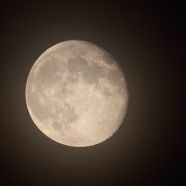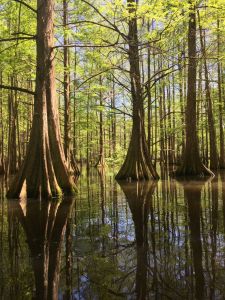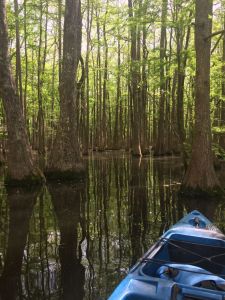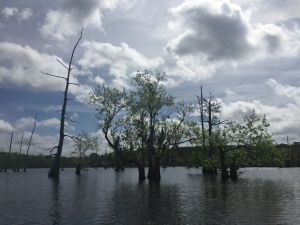
August 2013 Blue Moon. Photo by ccho. https://tinyurl.com/yy5jdem7.
Share This
Print This
Email This
Under a Blue Moon
I clearly remember lying on my back outside, looking up at the stars when my eight-year-old brain bent in on itself, grasping at the concept of an infinite universe. Our third-grade class had just gone through the solar system and I learned that stars were all suns just like ours. I’m pretty sure that most people have this existential moment with the stars sometime in their youth, and that it serves as a hit of relief throughout our lives when everyday grown-up things like dirty dishes and traffic start to wear on our spirit.
But it wasn’t until a few years ago that the sight of the full moon gave me a different mind-bender: that this is all a big experiment. I was on Orcas Island in the Pacific Northwest, sitting on a driftwood log around a beach bonfire and thinking about all the places around the world from which I’ve had the privilege of seeing the full moon, and how it always looks the same. We’re all seeing the same side of the moon. In different time zones, sure. And some places it’s more mesmerizing than others (depending on your whereabouts or the company you’re with) when you see it. But the full moon itself is our own little constant in this giant earthly petri dish. Though the world is vast, it’s not infinite.
Nature is one of my two favorite whereabouts from which to be mesmerized by the moon, preferably sleeping outside. The other is in New Orleans, peeking through the leaves of centuries-old live oak trees and popping out between the roofs of shotgun houses. As I was contemplating leaving the mountains and water surrounding my longtime home of Seattle to live in New Orleans four years ago, I voiced my single reservation about the move in a multitude of conversations about it: What about nature? Where was I going to find it?
It was a man I’d just met through a group of friends at a New York bar (who had generously become emotionally invested in my move) that said, “You’ll find it. It may not be the kind of nature that you’re used to, but it’ll be a different kind of nature. And that’s going to be interesting.” He held my gaze for a while, letting what he said stick, until I smiled and nodded. Then he said, “A year from now we’re going to talk again. And you’re going to be living in New Orleans.”
He turned out to be right. The city had seduced me with an assault on the senses, one that had a way of reminding me daily that I get to be alive in this body in this lifetime, so let’s use it. Relish in being alive here now and present in your life and recognize that you’re sharing it with a whole lot of other people—and that we’re all in it together for a relatively short time. It’s a place where strangers always make me feel welcome, who often address me as “my baby,” and the most valuable currency is just being nice, with extra credit for adding some love to that.
It was in the subversive beauty of the swamp that I found my nature. Similar to the city in the accelerated immersion of the senses, the swamp naturally forces a slower movement of your body through its thick, humid air while you start getting a hunch that there are unknown creatures (with varying levels of creepiness) just beyond your peripheral gaze, or below your feet, maybe watching you from a tree branch above, camouflaged in the green-brown of the Spanish moss draped and swinging on tall, thick trees. I discovered “Twilight Paddle” kayak trips with the local outfitter Canoe & Trail Adventures, where we’d paddle out a bayou to see the sunset and paddle back in the dark—only fireflies and stars lighting our way, the slow swishing sound of our paddles in the water, and the orchestra of frogs nearly deafening. Sometimes, we’d stop and shine a flashlight on the shore to see the reflective red eyes of the alligators who were much more indifferent than they were creepy.
So when I heard about an overnight paddling trip in a Southwest Louisiana swamp (organized by Pack & Paddle out of Lafayette) happening on a literal blue moon (the second full moon in one calendar month), I immediately signed up as a solo without a second thought. It wasn’t until I started packing up my camping gear in preparation for the two-hour drive that I started wondering who else I might meet—and be sleeping next to—on an island in the middle of the swamp. Mostly couples, I presumed. And likely people for whom the “Sportsman’s Paradise” motto on our state license plates resonates more than it does for me.
But there was the promise of the full moon, an island that we had special permission from the state park to camp on—thanks to the connections of our guide Carl (the president of the local paddle club that maintained the park’s paddle trail to make up for a gap in state funding)—a breakfast of his famous one-pot grits and eggs, and the holy preparation of honest-to-goodness Cajun gumbo on the fire for our dinner.
An hour after meeting some of the group at our early morning start point, I realized that I was getting an unexpected bonus of a cultural immersion into the heart of Acadiana (aka Cajun country) on this trip. In the carpool on the way there, my first new friend mentioned that she brought some hard-boiled eggs because “I know we’re going to have gumbo, and I can’t eat gumbo without a hard-boiled egg on top,” which is not something I’d seen or heard of in New Orleans. We made a pit stop at a convenience store and picked up some hot boudin (a Cajun sausage) for a breakfast snack. There was already talk about the lineage of the sacred cast iron pot our guide Charlee brought to prepare our dinner, which had originally been her great-grandmother’s.
Through the time-consuming and fairly arduous process of loading twelve people and their gear in at the put-in, it had become clearer to me that I was not going to be spending the night on an island with couples. Our group was a delightful gathering of curious and hardy souls, randomly drawn to this once-in-a-blue-moon weekend. We had elementary school teachers, a helicopter pilot and his son, physical therapists, a restaurateur, a marine, and a tugboat captain among us, many of whom had left their spouses at home. Over the next thirty-two hours I’d discover that each and every person there added a special seasoning to our sauce.
We meandered down the paddle trail slowly as our group established a pace. In the swamp, you must paddle slowly, winding your way through the shallow brown water of a flooded forest, carefully gliding between the underwater trunks of giant cypress and tupelo trees, navigating the nose and length of your kayak like a real-world video game, the paddle your joystick. The quiet stillness—even with a group of people—is similar to the muffled sound of walking in fresh snow, except there’s an added dimension of a haunting echo, which is filled with the chirps of fast-flying birds and the occasional daytime frog.
In the early afternoon we paddled through a particularly dense part of the swamp where flat, wide sunrays broke through like panes of frosted glass illuminating patches of foliage to a neon green. If I’d been there by myself, I could have easily gotten lost as I was looking into the depth of thick trees and green in every direction, no one direction revealing a more open sky than another as a way out. But instead, I was exchanging silent smiles with the other kayakers in my vicinity, as we happily got temporarily lost in this swamp snow globe together.
We did eventually find our way out and arrived on the island to unload and set up camp. While doing so, I thought about how we not only chose to abandon the comfortable temperature of our bug-free homes for the weekend, but we gave up a major chunk of it to arrange for our basic needs for one night outside: organizing, packing, hauling, setting up, unpacking, spreading out, cleaning up, repacking, hauling back, cleaning, organizing, storing back again. We were setting up beds in places where beds are not intended to be. We needed to create fire to feed ourselves and find a place to relieve ourselves. I think of this often when I’m camping, especially when I’m in a group of people who made the same choice. Why do we do this?
Part of why, I think, is how much life slows down in the simplicity of getting those needs met. Like the way after our beds were prepared, we came back to camp one by one, some standing over Charlee as she unpacked the pre-seasoned chicken thighs and grilled them on the fire, then started the roux in her great-grandmother’s sacred cast iron pot for the gumbo base. As instructed, I handed her the boxes of chicken stock when the roux had reached the required darkness. Others were sitting in chairs, chatting quietly and noticing the sound of a swarm of bees, then locating them high in the tree canopy above us. We took turns learning and practicing knots from the tugboat captain, which is an activity that started up because there was some rope and nothing else urgent to do. All these strangers making small talk and learning a bit about each other: Where were you born? How did you find out about this? You mean to tell me this was your first time in a kayak? I mention to a couple people individually that I assume we’re going paddling tonight again under the full moon, right? No one knows for sure.
After a good two hours of preparation, we feast on the gumbo. My new friend put her hard-boiled egg on her serving, though Charlee also brought along potato salad, which leads to a lengthy discussion (and debate) about the nuances of gumbo throughout the state (and within Cajun country itself) that all seem to lead back to a grandmother. An even lengthier discussion about cast iron pots ensues as Charlee cleans and re-seasons hers on the fire, which takes at least an hour.
And suddenly, we have no needs anymore. It’s dark. We’ve eaten, we’ve relieved ourselves, the camp kitchen is clean and ready for breakfast, and our beds are ready to roll into. It’s this moment—this window—that is the essence of why we came here in the first place. All we have is each other for entertainment. The conversation flows and we listen and tell stories as they naturally unfold, one leading to the next—some making us laugh hard and others making us introspective. Watching the fire is our electronic device. We look up at the stars and contemplate our place in the infinite universe.
Then, that window starts to close. You can feel the shift in mood, the contemplation of turning in by some of my new this-moment-in-life partners. I still want to paddle under the full moon. So I make my move. “So who’s in?” I say as I shyly make my way to standing. I don’t like leading, but I want this, and honestly I really don’t want to do it alone. Another soul stands, and we slowly start to move toward the shore. And then a couple others join. Then a few minutes later, we’re all at the shore, helping each other into our boats and we push off.
The main lake is as smooth as glass, and it’s brighter out on the surface of the water than it is under the trees, at least to our naked eye. In the phone camera lens, it’s pitch dark. There’s no capturing this, except in our memories. We push farther into the middle, with only one headlamp in use by our guide Carl because he’s good that way. We get far enough out to see the circumference of the island when the full moon reveals itself hovering over the end.
One at a time, we gently pull our paddles out of the water and rest them on top of our boats, drifting together with gentle bumps. I think we’re smiling at each other again, but it’s dark so I really can’t tell. We all fall silent as we sit out there in the middle of the lake, basking in the impossible, ethereal light of the full moon.
And now we have become those mysterious creatures in the swamp—all part of the grand experiment. But we’re here and alive right now, so we’re using it.
*All photos by the author










Tami
Diane here in Naples. Friend of Patty and Roy.
Patty shared this article with me. It’s beautiful!
You managed to capture quiet with words!
Congratulations on a great piece.
So beautifully written. One can feel her peace.
I could feel Tami catching me by the hand and saying “look and feel the beauty” in a way that only someone with this acute sensitivity can do. Thank you Tami for taking me along.
Absolutely enjoyed your experience. I feel like I was there. For brief moment I saw your Blue Moon.
What an incredible piece! So beautifully written. Thank you, thank you.
Thank you for taking me to a place I probably would never have gone. I felt as though I was there!
You had me at the first line when you wrote “my eight-year-old brain bent in on itself” Delightful writing!
Greetings from the “Wuhan” of America, your previous home, Seattle.
A wonderful piece of writing….
Camille, late of ExOfficio
Really well done, Tami! I felt like I was there on the trip! Thanks for bringing us all along!